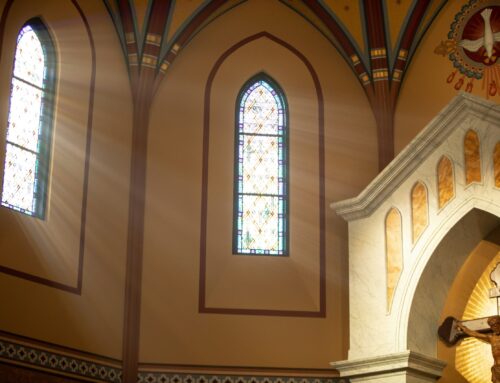
Is Christmas a Pagan Holiday?
Q: I’ve heard that Christmas is a pagan holiday, and that we Christians should not celebrate it because it is based off some pagan celebration of the birth of the “Invincible Sun”. What’s the story?
A: So, that’s a very good question. There has been a history of various people who have protested the celebration of Christmas or called its origins into question. For example, celebrating Christmas was made illegal in England by an Act of Parliament in 1644. The traditional Christmas foods were condemned. People were even killed over the issue. In more recent years, with the popularity of such books as The Da Vinci Code, there seems to be a renewed interest in discrediting the origins of Christmas. Most of these issues surround the place that various pagan symbols and dates may have played in forming our current celebration.
First of all, Christmas is definitely a Christian holiday. Its origin is simple: it is the celebration of the day when the Second Person of the Trinity, God’s Holy Word, was born into this world. That’s it. This is a definitive moment in the history of the created world unlike any other. This is about Jesus Christ and no one else (hence the “Christ” part referring to “Christ’s Mass”…did you know that when you wish someone a “merry Christmas”, you are wishing them a good “Mass of Christ” on December 25th?).
And yet, for all its significance, Christmas wasn’t celebrated as an official feast by Christians until 200 A.D. in North Africa. Even then, it took nearly another 200 years until celebrating the Nativity on December 25th gained universal acceptance by the Church. This is most likely due to the fact that, according to one author, “The cross overshadowed the manger” for early Christians.
Originally, various dates where chosen to celebrate Christ’s birth. April 20th in Egypt, sometime in January for Mesopotamia and Jerusalem, and even November in other regions. There is some evidence that Christmas may have been celebrated in Rome on December 25th as early as 205 AD. This was certainly true by the year 335.
But wait. Doesn’t that prove the challenge to be legit? The fourth century was the time when Christianity became an official part of the Roman Empire. December 25th was the feast of Sol Invicti or Natalis Invicti (“the invincible sun” or “birth of the unconquered”). The solar-cult, known as Mithraism, dedicated December 25th as the birth of the Sun-god, Mithra.
“Ha! So there! Isn’t this the point when Christianity simply became “paganized” by the Romans?” My friends, it is the other way around. This is the point when paganism became Christianized. There may be no connection other than the notion that the thought that invented the idea of the sun’s birth in Winter is the same thought that ascribed Christ’s birth to Winter. There is a wonderful symbolism in that. “Any one thinking of the Holy Child as born in December would mean by it exactly what we mean by it; that Christ is not merely a summer sun of the prosperous but a winter fire for the unfortunate” (G.K. Chesterton).
But even if there was a connection with Saturnalia or Mithra, this means next to nothing to thinking and believing Christians. There have been myths among various cultures and cults that speak of gods who die and rise again. There are others that tell of the “birth” of a god. These stories do absolutely nothing to discredit Christianity, which seems to claim something similar. C.S. Lewis, in looking at these similarities, called them the “good dreams” that God gave to these peoples in order to prepare them to receive the Gospel. As Catholics, we do not fear other religions. We have a confidence in proclaiming that truth can be found in virtually every religion and every culture through history. We do not believe that every other religion is simply wrong through and through. We do believe that, where we disagree, that Catholicism is right, but there are other varying degrees of truth in all religions.
Pope John Paul II spoke about the ways in which Christians are called to “inculturate” the Gospel. This boils down to how we can proclaim Christ in any culture and to any people. The Pope said that we can approach a culture with confidence and that we must retain whatever can be retained in that culture. If there are aspects of that culture that are distinctively anti-Christian or are ultimately irreconcilable with the Gospel, then those parts are to be discarded. This is what St. Paul said when he wrote to the Thessalonians, “Test everything; retain what is good” (1 Thess. 5).
All of this can be summed up in the words of the great Catholic convert and writer, G.K.Chesterton. When it comes to the battle between paganism and Christianity, he wrote, “Paganism was the biggest thing in the world; Christianity was bigger. And everything since has been comparatively small.” Merry Christmas.




